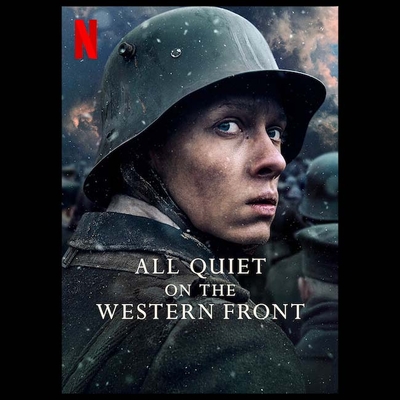"It is now sixty years since the First World War ended," Vera Brittain wrote in the preface to the 1978 paperback edition of her memoir, Testament of Youth, "and few are still alive who survived that fearful experience at first hand." Nearly forty-five years have passed since then, nobody is alive today who lived through that war, and now we watch the people who fought and lived through the Second World War disappear every day.
"Yet the First World War refuses to fade away," Brittain went on. "It has marked all of us who were in any way associated with it, even at one generation's remove through our parents. The books, the poetry, the artifacts of those four and a half years still speak to young men and women who were not even born when the Second World War ended."
Erich Maria Remarque was not so certain of this when he published All Quiet on the Western Front in 1928, ten years after the war was over, and five years before Brittain's book was first published: "And men will not understand us – for the generation that grew up before us, though it has passed these years with us here, already had a home and a calling; now it will return to its old occupations, and the war will be forgotten – and the generation that has grown up after us will be strange to us and push us aside."
"We will be superfluous even to ourselves, we will grow older, a few will adapt themselves, some others will submit, and most will be bewildered; the years will pass by and in the end we shall fall into ruin."
The new movie version of Remarque's novel – the third since Lewis Milestone's in 1930; the first made by Germans, and currently streaming on Netflix – begins on the battlefield, as a soldier named Heinrich Gerber struggles across no-man's land in a chaotic charge against the French lines. We see him kill men in a frenzy but we don't see him die.
We do see his body, however, pulled from a pile, his uniform stripped off him. We follow the uniform in a sack, loaded into a boxcar and shipped to a factory where it's washed and mended by young women, then tied up neatly and driven in a truck to northern Germany in the spring of 1917, which is where we meet its next wearer – a student named Paul Bäumer (Felix Kammerer).
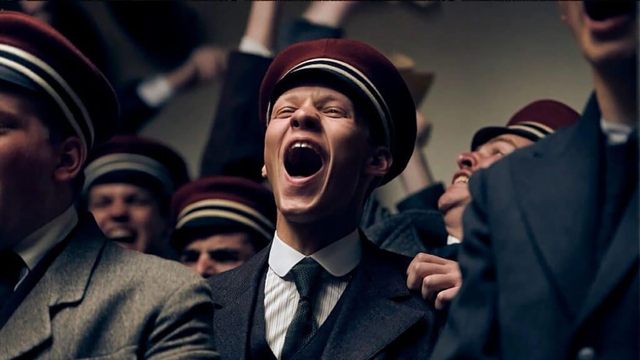
Paul is introduced as part of a quartet of schoolboys, all of whom are eager to join the army, with the encouragement of their teachers, one of whom delivers a rousing, patriotic and jingoistic farewell to the boys about to enlist. We know – because the First World War taught us and books like Remarque's and Brittain's and a hundred subsequent movies made it accepted fact – that few, if any, of these boys will be alive when the movie is over.
We don't know much about Paul or his friends except that Paul's parents are unwilling to sign his enlistment papers. "I'll be the only one left behind," he complains, but a signature is easily forged and, as everyone apparently knows, the army was loathe to check up on every new recruit.
The next few scenes follow as the boys become soldiers with simple economy; standing in his underwear in a hall filled with other boys, Paul proudly accepts his uniform, but brings it back when he sees Gerber's nametag on the collar. A mistake, he's told. It probably didn't fit its previous owner and was returned; Gerber's name is torn off and surreptitiously dropped on the floor, where it joins many others.
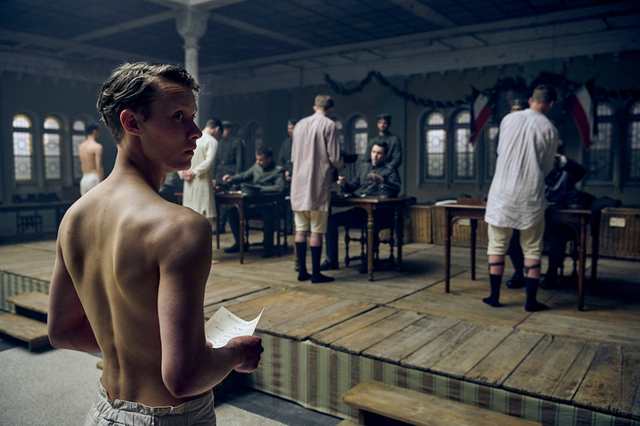
There's a history lesson being taught in these opening scenes, for the benefit of anyone without even a basic familiarity with the First World War. There's an industrial process in place for the acquisition, use and disposal of soldiers; with the Allies blockading German ports, supplies of everything from shells to wool to beans are scarce. A uniform is a precious piece of kit; the man who fills it is a consumable, more easily replenished, or so we're meant to understand.
Both the Milestone film of Remarque's novel – nominated for four Oscars in 1930, winner of two – and the 1979 TV version, directed by Delbert Mann and starring Richard Thomas as Paul, show the boys going through basic training under the brutal oversight of Cpl. Himmelstoss. The new version, directed by Edward Berger, dispenses with Himmelstoss and training altogether, and sees the boys conveyed, on trucks and by foot, almost seamlessly from enlisting to the trenches.
One supposes that, after decades of war movies, scenes of basic training are superfluous – a waste of time after a film like Stanley Kubrick's Full Metal Jacket (1987) created the definitive boot camp brutalization scenario. Or maybe we're meant to understand that training by the third year of the war was perfunctory, mostly a waste of effort considering how a war of attrition, in place over static lines since the fall of 1914, was really just about plugging holes in a ragged wall.
How true this is would be debatable, but it's how history is being presented in 2022, to an audience that is unlikely to have met anyone who lived through the war, or even anyone who might have known such people.
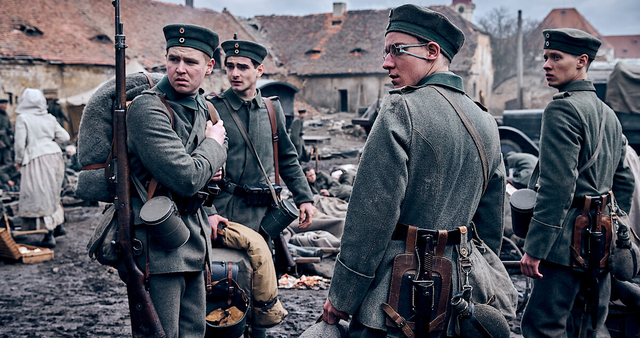
What we're supposed to see is the rapid transformation of Paul and his friends from boys to soldiers, which only really begins the moment they arrive in the trench they're tasked with defending. It's here that Paul meets Stanislaus Katszinsky (Albrecht Schuch) – "Kat" for short, a veteran German soldier with a Polish-sounding name, whose family might have been Pomeranian or Silesian, an ethnic relic from recent history, when Europe's borders were more fluid.
Punished for taking too long getting his gas mask on during the march to the front, Paul has the phenomenon of arbitrary power explained for him by the older man, who emerges from a dugout in the side of the trench and sums up the single law of war in a phrase:
"Man is a beast."
That night the boys endure their first artillery barrage, and get their first taste of shell shock. Kat and the older soldiers try to stop men from fleeing the relative safety of their bunker for the trench, but they fail and poor, bespectacled Ludwig (Adrian Grünewald) is blown to pieces, the first of the quartet to die – much as any viewer familiar with the conventions of the war film could have predicted.
Paul is buried alive when the bunker collapses, and gets dug out the next morning; if you're invested in religious symbolism you could say that he's been resurrected. If you're less charitable you could simply judge that Paul is living on borrowed time.
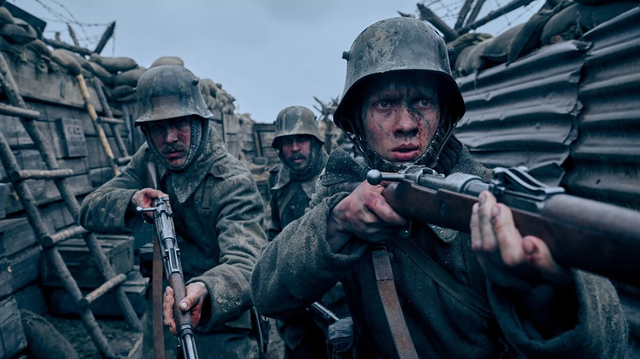
The film cuts to eighteen months later, with the war in its final stages. Paul is now a veteran, and we watch him help Kat steal a goose from French farmer's barn; food is as scarce as uniforms, and foraging – civilians would call it looting – has become necessary. We watch Paul and his friends enjoy their stolen meal while billeted in a rear area; it's a moment of joy and camaraderie that won't be repeated.
The film opens up from being the story of mere soldiers with the introduction of General Friedrichs (Devid Striesow), a career soldier in charge of Paul's regiment, and Matthias Erzberger (Daniel Brühl), a politician leading the team negotiating peace terms with the French. Friedrich is a caricature Prussian, contemptuous of the politicians pleading for peace and intent on fighting the war at whatever cost until the moment it ends; he's a composite, a stand-in for Erich Ludendorff and all the other members of the military class who would deny their role in Germany's defeat and insist that politicians and Jews had brought it about with a "stab in the back."
But Erzberger was a real man – a member of the Catholic Centre Party whose early support of the war (he advocated for the annexation of both Lorraine and Belgium) had turned to opposition by 1917. He was a minister without portfolio in Kaiser Wilhelm's last cabinet, sent to negotiate an armistice with Marshal Foch in a railway car parked in the Forest of Compiègne. After the war he was assassinated by two former Imperial German Navy officers who joined Organisation Consul, a terrorist group whose members would later be incorporated into the Nazi SS.
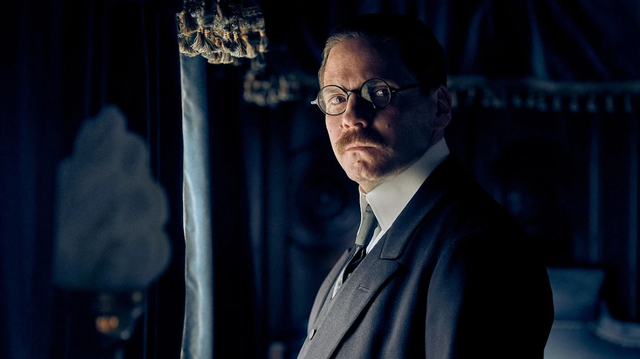
Remarque's novel never pulls out from its focus on Paul and neither do the 1930 Milestone film nor the 1979 TV movie. It can only be guessed that Berger, along with screenwriters Ian Stokell and Lesley Paterson, felt that the audience needed some political and historical context for why Paul and the other soldiers were trapped in this hellish, unwinnable stalemate – not to mention some relief from a soldier's life, with all its apparently endless miseries and terrors.
The actual causes of the war are beyond the scope of the film. The closest it gets to the subject is a speech by Kat near the end, on the last night before the armistice:
"All of this is like a fever. No one actually wants it but suddenly it's here. We didn't want it. The others didn't want it. And yet, here we are. And yet, half the world is here. And God watches on as we slaughter each other. Well...But what do I know? I know nothing. I'm a pair of boots with a rifle."
Today we consider a multi-part documentary series or a thick book like Barbara Tuchman's The Guns of August necessary to explain how the war started – the complex mechanisms of royal dynasties, naval arms races, imperial ambitions, economic imperatives, mutual assistance treaties and secret diplomatic pacts whose linkages to tactical war plans and railway timetables made war inevitable once an Austrian royal and his wife were assassinated by a lucky student fanatic on a street in Sarajevo.
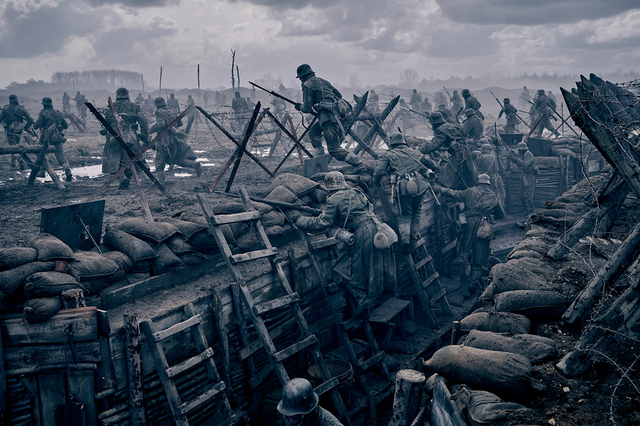
On paper it's a Rube Goldberg geopolitical contraption, and even if you understand the whole story it still seems hard to believe; most people seek comfort in the idea that this was just a function of how the world once worked, before the war swept it all away, the good and the bad – goodbye to all that, as British poet Robert Graves would say in the title to his 1929 memoir of life as a soldier.
In his book The Pity of War, Niall Ferguson proposes something he acknowledges as "the most shocking argument which it's possible to advance about the war," quite contrary to the message of war poets like Wilfred Owen and the subsequent conventional wisdom:
"Killing aroused little revulsion and fear of death was suppressed, while non-fatal 'Blighty' wounds were even coveted...For some, revenge was a motivation. Others undoubtedly relished killing for its own sake: to those intoxicated by violence, it really could seem like 'a lovely war.' At the same time, men underrated their own chances of being killed. Though the chances of a British soldier in France being a casualty were around 50:50, most men assumed the bells of hell would not ring for them as individuals and became to some extent inured to the sight of others suddenly dead (it was watching a man die slowly which was distressing)."
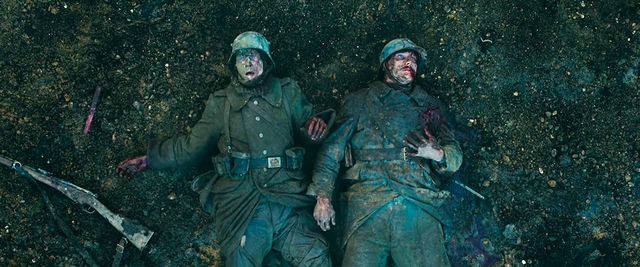
A scene from Remarque's book that appears in all three movie versions illustrates this last point: Paul is stranded in no-man's land after an attack on the French trenches and stabs a French soldier who tries to seek shelter in the same shell crater. The animal urge to defend himself dissipates once he realizes that the man is going to die slowly in front of him. He's lost the urge to finish him off, and ends up trying to comfort the dying man, pleading with him for forgiveness, and dissolving into regretful sobs when he finds letters and a picture of his family in his pockets.
The scene plays out with significant variations in each film. In Milestone's movie it's far more overtly emotional, even melodramatic; in the Netflix film it's almost wordless, with Paul's horror, regret and disgust playing out on his face, and finally in pitiful, wounded sobs and groans.
English war poets like Owen, Graves and Siegfried Sassoon were deputized as the voice of the common soldier after the war (in spite of their not-very-common backgrounds), studied in school for generations. In his book Ferguson notes that they had equivalents on almost all sides of the conflict, and he quotes a poem by Alfred Lichtenstein, who died before the end of 1914:
God protect me from misfortune
Father, Son and Holy Ghost,
May no high explosives hit me,
May our enemies, the bastards,
Never take me, never shoot me,
May I never die in squalor
For our well-loved fatherland.
Look, I'd like to live much longer,
Milk the cows and stuff my girl friends
And beat up that lousy Josef,
Get drunk on lots more occasions
Till a blissful death o'er takes me.
Look, I'll offer heartfelt prayers,
Say my beads seven times daily,
If you, God, of your gracious bounty,
Choose to kill my mate, say Huber
Or else Meier, and let me off.
The French director Francois Truffaut is credited with saying that "there's no such thing as an anti-war film," by which he meant that, despite what's written in the script or explanations given by writers and directors, simply depicting war onscreen is necessarily cinematic and viscerally thrilling. Netflix' All Quiet on the Western Front might not provide much in the way of geopolitical explanations but it delivers on cinematic spectacle.
Every soldier's experience of life in the trenches was dismal, but once the camera pulls back and the action begins, it's hard not to deliver something epic. The second-to-last battle scene of the film delivers most of all – a sequence that begins with a German assault on French trenches, reversed when French tanks lead a counterattack that ends with the French sending ranks of men with flamethrowers to clear out and re-take those trenches.
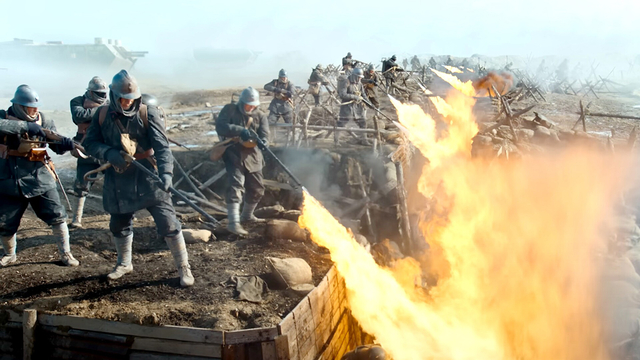
It's both terrible and awesome – in all senses of those words. It provides a sense of the seesawing action over lines over nearly four years of the war; futile, to be sure, but perhaps better than sitting in a flooded trench dealing with rats, lice, trench foot, snipers and artillery for weeks or months at a time. Running to and from bullets provided a moment of what might feel like agency, even if it was done at the bidding of officers and politicians miles from the battle.
Or at least that's my fumbling attempt to grasp just how and why soldiers followed orders for years, enduring what we're still told was unendurable. Because here's the thing: I have no way of knowing what life on the Western Front was like, and I have no way of asking anyone who did. The only way I can know about a soldier's life in the trenches is through books – and movies like All Quiet on the Western Front.
Perhaps Vera Brittain was right. As much as we despair at the state of historical education, movies about the First World War haven't become scarce; it's only been three years since Sam Mendes' wildly cinematic 1917, which got ten Oscar nominations and won three, and four since Peter Jackson's documentary They Shall Not Grow Old, both of them technical milestones in their portrayal of that war.
And despite the many qualities of his book, Erich Maria Remarque turned out to be very wrong. The generation of men who fought in the war were not superfluous or pushed aside by younger ones; five years after he published his book they took power in Germany and prepared that younger generation to fight in their war's sequel, but before that would happen they banned and burned Remarque's book and sent him into exile in America. (While there he had affairs with Hedy Lamarr, Dolores del Rio and Marlene Dietrich, and married Paulette Goddard; life turned out to be more interesting than he would imagine when he predicted a "fall into ruin.")
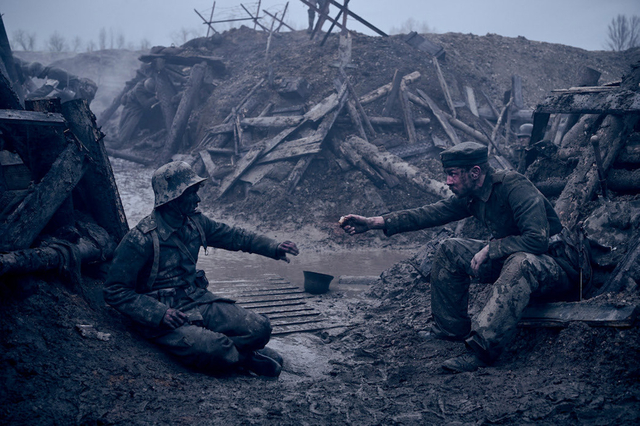
The movies began to achieve their first artistic and technical pinnacle around the time of World War One, and you could argue that the war helped them develop the visual vocabulary to depict war onscreen, with movies like The Lost Battalion (1919), The Four Horsemen of the Apocalypse (1921), The Big Parade (1925), What Price Glory? (1926), Wings (1927), Journey's End (1930) and finally Lewis Milestone's All Quiet on the Western Front.
Compared to the Netflix film, Milestone's film looks like a product of the early talkie era. The camera is either locked off while actors perform inside its static frame, or audacious in its movement through the battlefield. The performances are often melodramatic and overemphatic, but you can't deny their intensity, an emotional fervency that's hardly surprising, in that everyone who worked on the picture had lived memories of the war.
Two scenes still have the power to shock or affect us. There's the shot during the film's big battle scene, where the smoke from a shell clears to reveal a pair of hands, torn from their body, still gripping barbed wire, which causes Lew Ayres' Paul to recoil in horror and dismay. And then there's the final shot, of soldiers we've watched die as they march away to a vast graveyard, turning back to look at us one last time. Sentimental, to be certain, but to anyone who'd lost someone during the war, it must have felt like a blow to the heart.
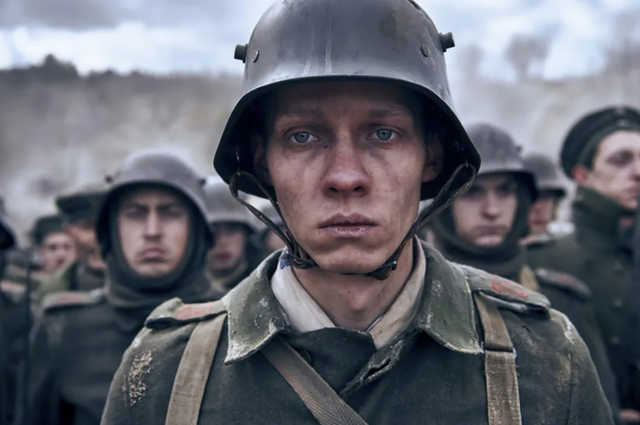
The Netflix film changes the timeline from both the book and previous film versions by having nearly half the picture happen in the last days of the war. While Erzberger pleads and Foch demands, men keep on dying; when the armistice is finally signed early in the morning, fighting is decreed to continue until just before noon. If only to satisfy some sort of desire for order and symmetry that must have appeared as obscene then as it does now, nearly 3,000 men will die in the six hours before the eleventh hour of the eleventh day of the eleventh month.
Kat is killed early in that morning, shot by a farmer's boy while stealing eggs. Paul and the rest of his regiment are sent by Friedrichs on one last assault to take back the trench they lost. And just like Gerber at the start of the film, we see him running headlong in the chaotic charge, killing in the same frenzy.
What all the adaptations of Remarque's novel have in common is the requirement that they portray Paul's death as both poetic and pointless. Paul's death in the book happens on "a day that was so quiet and so still"; Ayres dies reaching for a butterfly just outside his trench; Thomas while drawing a bird.
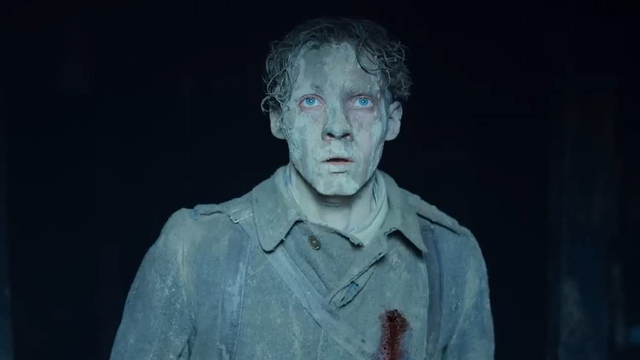
Kammerer's Paul appears to be very nearly the last casualty of the last minute of the war. (In real life it was an American soldier, Henry Gunther, the son of German immigrants.)
The Netflix film wants us to feel Paul's death with the same intensity that it pours into the battle scenes. For young people and western viewers, a generation or more with no lived experience of war, this added significance after all the vivid battlefield hyperrealism that came before is a technical triumph, but it feels unearned.
You want to hope that we'll be able to maintain our blissful ignorance, but I'm doubtful. The last few months have seen the transformation of doves into hawks – friends who were adamantly opposed to "wars for oil" suddenly cheerleading the deaths of Russians at the hands of Ukrainians, as avidly as the young students at the beginning of every film version of Remarque's book.
Every film like All Quiet on the Western Front has a touchingly naïve conviction that, once seen and absorbed, their message could make war impossible. Human nature – and the last century – suggests that might not be possible.
Mark Steyn Club members can let Rick know what they think by logging in and sharing in the comments below, as access to the comments section is one of many benefits that comes along with membership in the Mark Steyn Club.


